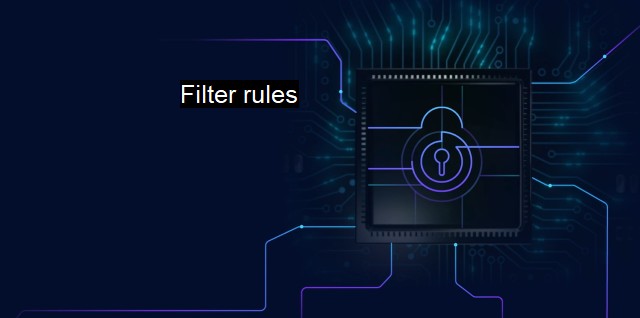What are Filter rules?
Securing Your Network: The Importance of Filter Rules in Antivirus and Cybersecurity Technology"
Filter rules, also referred to as firewall rules are defined criteria that determine what is permitted or denied on a network. The primary purpose of filter rules is the effective handling of data communication between diverse network entities. These rules can help control the traffic that enters or exits a private network or a single computer on the network. Their relevance heightens in the areas of antivirus and cybersecurity, which exploit these rules to strengthen the security structure of an organization's IT landscape.Filter rules serve as an instrumental mechanism inside the multiple defense lines provided by cybersecurity systems. Their basic functionality lies in analyzing the packets of communications passing through the network and subsequently deciding whether to permit them, based on the rules defined. Packets are blocs of data that are transmitted over a network. A typical rule specifies what action to take with arriving packets, usually allowing or blocking them, that matches the conditions laid by the rule.
The filter rules are typically established by network security administrators, who set measureable conditions depending on the source of the IP address or the type of network transport protocol, among other custom-specific criteria. It’s crucial for these rules to be defined accurately to ensure network safety, avoid the entry of malicious software and cyber threats, and maintain the functionality of the network.
Filter rules form a major entity of firewall systems. Firewalls usually follow a set of filter rules to inspect and regulate the incoming and outgoing network traffic based on predetermined security regulations. Firewalls can either accept or reject an entire data flow in accordance with the particular filter rules applied, providing a robust defensive layer against unauthorized or potentially hazardous access to the network.
These rules have an indispensable function in antivirus applications. Typically, antivirus applications are integrated with the systems to prevent, detect, and remove malicious software. With a set of carefully designed filter rules, the antivirus application can effectively differentiate between secured and endangered data, thereby guarding the system against virus, Trojan, worm, or any sort of cyber threat attacks.
Another crucial area where filter rules find their application is detecting and preventing spam. Network administrators can set filter rules that identify and prevent emails that might contain malicious attachments, phishing attempts, or unwanted content from finding its way into the user’s inbox.
Over recent years, the implementation intensity of filter rules increases in alignment with the escalation in cybercrime activities. These codecies of conditions are a cornerstone of advanced layers of cybersecurity systems across different organizations. They ensure the advanced monitoring of networks to detect unusual behavior or attacks and offer an early response mechanism to potential threats.
The setup and maintenance of filter rules requires expertise and careful management. False positives or negatives may occur if these rules are not properly implemented and updated. Some harmless behaviors may be mistook for malicious activities and vice versa, which can result in unauthorized access to sensitive information or potential network attacks.
Filter rules are fundamental parts of cybersecurity and antivirus protocols that bolster the capability to safeguard against a plethora of cyber threats. They are technical specifications defining what data packets will be processed or blocked on a network, helping to maintain the security and integrity of the overall information system. As technology advances and cyber threats grow more sophisticated, the importance, complexity, and functionality of filter rules in antivirus and cybersecurity can only be likely to surge, key to creating a safer network environment.

Filter rules FAQs
What are filter rules in cybersecurity?
Filter rules in cybersecurity refer to a set of parameters that determine which network traffic or data is allowed or denied access. These rules are used in antivirus software to detect and block malicious content from entering a network or computer.How are filter rules applied in antivirus software?
Filter rules are applied in antivirus software by analyzing incoming data against a set of predetermined criteria. If the data matches any of the criteria, it is either allowed or denied access depending on the specific filter rule. These rules can be customized by the user to fit their specific security needs.Why are filter rules important in antivirus software?
Filter rules are important in antivirus software because they help prevent cyber attacks and malware infections. By setting up rules that block malicious content from entering a network or computer, users can significantly reduce the risk of a security breach.Can filter rules be used for more than just antivirus software?
Yes, filter rules can be used for a variety of cybersecurity applications beyond antivirus software. For example, filter rules can be used in firewalls to block unwanted traffic, in email filters to block spam, and in web filters to block access to inappropriate content.| | A | | | B | | | C | | | D | | | E | | | F | | | G | | | H | | | I | | | J | | | K | | | L | | | M | |
| | N | | | O | | | P | | | Q | | | R | | | S | | | T | | | U | | | V | | | W | | | X | | | Y | | | Z | |
| | 1 | | | 2 | | | 3 | | | 4 | | | 7 | | | 8 | | |||||||